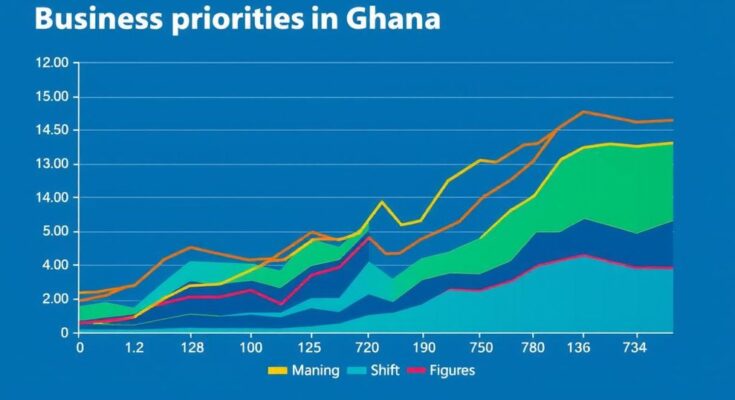The 2025 Pre-Budget Survey reveals that Ghanaian businesses oppose the E-levy and COVID-19 levy while supporting a 24-Hour Economy Policy. Business leaders expect the upcoming budget to foster economic recovery, with proposals for tax relief, a Women’s Development Bank, and a significant educational policy shift planned for presentation on March 11, 2025.
The 2025 Pre-Budget Survey conducted by KPMG with the support of UNDP has unveiled critical priorities for Ghanaian businesses as the government prepares its fiscal plans. Engaging 233 companies from diverse sectors, the survey indicates a strong opposition to both the E-levy and the COVID-19 levy, with half of the respondents advocating for their elimination. Conversely, a remarkable 72% of participants support the introduction of a 24-Hour Economy Policy to stimulate economic growth.
Business leaders expressed optimism regarding the upcoming budget, with 80% believing it will foster economic recovery. This positive outlook primarily stems from expected tax relief measures and the potential benefits of the 24-Hour Economy initiative. Nonetheless, apprehensions about the revenue consequences of abolishing these levies persist. To counter potential deficits, businesses proposed broadening the tax base to include the informal sector, reviving road tolls, and privatizing less effective state-owned enterprises.
Companies also emphasized the necessity for supportive actions to ensure the success of the 24-Hour Economy Policy. Recommended enhancements include improving security, ensuring reliable power supply, upgrading transportation infrastructure, and implementing tax incentives for businesses.
Additionally, Felix Kwakye Ofosu, the Minister of State for Government Communications, has announced the government’s commitment to remove the E-levy and COVID-19 levy in the upcoming budget presentation scheduled for March 11, 2025. This decision aligns with the broader 120-day Social Contract, which contains 26 commitments aimed at rejuvenating the national economy.
Furthermore, the forthcoming budget will feature several other significant proposals, including a 10% tax on betting winnings, an emissions levy, the establishment of a Women’s Development Bank, and initiatives for job creation. Notably, the government plans to introduce a ‘No-Academic-Fee’ policy for first-year students at public universities, representing a notable change in educational funding.
In summary, the 2025 Pre-Budget Survey indicates strong preferences among businesses for the elimination of specific levies and the implementation of the 24-Hour Economy Policy. While optimism regarding the fiscal framework is prevalent, concerns about revenue loss remain significant. The government’s upcoming budget presentation is set to address these issues and introduce various innovative policies aimed at enhancing economic recovery and support for education.
Original Source: www.ghanaweb.com




